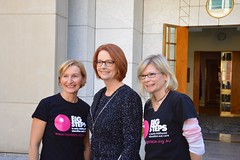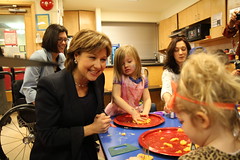It's tax time - are you ready? Chances are, if you started a home based child care enterprise in 2007 you are feeling very overwhelmed about your taxes. I know that feeling! I ran a home daycare for nine years and tax season can be intimidating! whether you are having a expert complete your taxes or you are doing them yourself, there are any things you need to know to help the process go more smoothly.

First let's talk about the issue of expert tax preparers versus doing it yourself. Which method is better? I personally have used both methods. The first year I needed to file taxes for my home child care business, I attended a workshop put on by a local community college that dealt specifically with taxes for child care businesses. It was extremely helpful. I would advise asking nearby to find out if there is something like that ready in your area. You can check with other daycare providers, local community colleges, or child care organizations to see if someone can point you in the right direction. After attending the seminar, I decided to do the taxes myself that first year. I felt like I had a pretty good handle on the situation and expert tax preparers can be costly. I was able to get help from the Irs straight through their website http://www.irs.gov, and over the phone (see website for phone numbers). It takes some patience to get straight through to them because sometimes the hold time is lengthy, but when you do get straight through the help is outstanding! That first year I did my taxes the old fashioned way...on paper! I completed them on paper for a couple of years actually.
Child Care
A few years into my daycare enterprise I chose to have a expert complete my taxes, mostly because of some items to be addressed in our personal taxes that we weren't sure how to handle. I was relieved to find out that I had been doing a pretty good job with my enterprise taxes! The accountant was able to find a few more deductions that I hadn't been claiming that proved to be very helpful. After that year, I chose to go back to doing my own taxes, but I decided to use one of the tax software programs. They turned out to be easier than I plan they would be and the online inquire center was very helpful. I loved that I was able to file my taxes electronically, which significantly reduced my wait time to receive my refund. I prolonged to complete my taxes using computer software for the period of my child care enterprise years. Personally, I think that you can successfully complete your enterprise taxes yourself, especially using tax software, and save yourself considerable money. It might be beneficial to have a expert do it the first year so you are obvious that you are taking all of the deductions you should take. After that, you can look back on the first year taxes as you complete them yourself to ensure that you are completing them correctly.

California Baby Aloe & Arnica Soothing Spray, 6.5 oz Specification
- Soothes & cools skin after sun exposure
- Heals and moisturizes
- Recommended for eczema and other skin sensitivities
- Contains organic & sustainably grown ingredients
- Non-comedogenic
Available Stores
|
What sort of deductions should you be claiming? One of the biggest deductions you should be logging is your mileage. This is easily one of the deductions that I wasn't claiming until I had a expert complete my taxes. I found out that I had been missing out on a huge tax savings by not retention track of my mileage. I didn't fully understand what mileage I could claim for my child care business. I plan I could only claim mileage for field trips or training classes. How very wrong I was! A home daycare supplier can claim mileage for Any trip in which child care enterprise is conducted. This means that every trip to the grocery store to buy food for daycare, every trip to buy art supplies or toys, every trip to the bank to deposit child care income, is a enterprise trip and you should be retention track of your mileage!
Mileage is deductible from your home to the location and back again. That being said, you need to be honest with your mileage calculations. If in one day you first travel to the bank to deposit checks and then you head to the grocery store to buy food before heading home, you can't count mileage from home to the bank and from home to the grocery store. You need to calculate mileage from home to the bank, from the bank to the grocery store, and from the grocery store to your home to be fair. Just to give you an example of how large a deduction mileage can be...I live in a rural area, so a trip to the grocery store and back for me is about 30 miles. The bank is even further. In an average year, I was able to claim roughly 10,000 miles for a deduction for my child care business! This comes out to be a 00-00 deduction! I know you are wondering what to do if you make a trip to the grocery store to buy both food for your enterprise and food for your family.
Can you claim that mileage? Absolutely! You are still there conducting daycare business, so that mileage is deductible! I know your next inquire is, "I didn't keep track of my mileage for 2007, so do I lose out on that deduction?" Not necessarily. One method I use to calculate mileage is the receipt method. I am sure that you have been recovery your receipts from trips to the store. You need them for tax purposes anyway (see next paragraph). You need to go back straight through your receipts and create a mileage log based on them. Count up how many times you went to each store and write it up, including the name, address, and calculate for going to each store. Then you will need to logon to a website such as http://www.mapquest.com and select the selection for looking directions. Put in your beginning address (usually your home) and the address of the store you went to. Then click on find directions. When the schedule lists the driving directions, it will also list the mileage. You will need to duplicate the mileage, since the schedule only gives you mileage for the trip to the location, not for the return trip.
Once you have the roundtrip mileage for a obvious store, multiply the mileage by the estimate of times you went to that store for daycare enterprise in 2007. Voila...you have a mileage log! You will need to calculate the estimate of times you went to the bank for childcare also, and use the same method as above for calculating the mileage. If you don't save all of your deposit receipts, go back straight through your checkbook registers to find all of your deposits. Remember to contain things like field trip mileage, or trips back and forth from the school if you pick up child care children from preschool or kindergarten. Using this method will give you a fairly definite calculation of your mileage and can provide you with a huge tax deduction!
Another deduction that you should be claiming is the cost of food and supplies for child care. This is someone else huge tax deduction! There are two ways to handle food for child care. You can whether shop separately for your daycare food than for food for your family, or you can shop for both at the same time and separate items for daycare later on your receipt. Personally, I didn't shop separately for two reasons. First, if you shop for food that is to be used for your home daycare business, then that food can Only be used for your home child care business! That means that if your son or daughter wants to take a granola bar to school for snack and you purchased those for daycare, you are going to have to say no. I know that sounds extreme, but if you are claiming those items as strictly child care items, you need to keep them separated from food for your family. Secondly, it is easily a pain in the neck to do separate shopping for your house and your business! It means whether separate trips to the store, or at least separate shopping carts in the store! The advantage to shopping separately is that you can claim every penny spent on food for child care on your taxes.
I chose to shop for my house and my enterprise together and not to keep the food separated. It made things a lot easier in my house. However, it did make my record retention for my enterprise a limited trickier. Once a month I had to go straight through my grocery receipts and mark off items that I knew were not used for child care, such as coffee or soda pop. Once I had eliminated those items from my receipt total, I then had to calculate which items on the receipt were food items, which were consumable items (like toilet paper) and which were non-consumable (like toys). I then calculated a total estimate for that receipt of each of these categories and wrote it at the top of the receipt. Come tax time, I calculated a total estimate spent for the year for each of these categories. Then, in order to fairly calculate a deduction for each of these categories based on how much was used for child care and how much was used for my family, I had to apply the time-space method to each category.
The time-space method is an invaluable equation that allows you to fairly claim child care expenses based on how many hours out of the year you spend being a daycare provider. The equation is fairly simple. First, you need to calculate the approximate estimate of space in your home that you use for your child care business. You need to contain every space that is ever used for daycare. You need to contain your former child care room of course and your kitchen. But you also need to contain the bathrooms that the kids use, the dining area if they eat or do crafts there, the laundry room since you will invariably be washing blankets, sheets, towels, etc. That were used for daycare, any rooms in which children nap, your home office if you use it to create forms and file enterprise paperwork, and any other place the kids use. You need to exclude any rooms that the children in your care never use. Be fair in calculating the approximate division of your home that is used in your business.
Once you have this percentage, you need to shape out the approximate estimate of hours you spent in 2007 performing duties related to your business. You, of course, need to shape out the estimate of hours per day that you easily care for children. You also need to take into notice the approximate estimate of time per day that you spend cleaning up from child care or getting ready for child care. Then you need to shape out exactly how many days you provided these services in 2007. You then multiply the estimate of hours per day by the estimate of days you provided care. That gives you the estimate of hours you spent in your enterprise in 2007. Now you need to shape out the division of hours you spent in your enterprise compared to the estimate of hours in a year. There are 8760 hours in a year. So, take the estimate of hours you spent doing daycare and divide it by 8760 and this will give you the division of time you spent doing child care in 2007. Finally, you need to multiply the division of time you spent doing daycare by the division of your home used for enterprise to find a final division that you can claim for costs shared by your enterprise and your family.
This gives you your time-space percentage. Here is an example: Let's say you resolve that you use 80% of your home for your business. Now, you spend on average 10 hours per day on your enterprise and you calculate that you spent 200 days being a child care supplier in 2007. Multiply the 10 hours per day by the 200 days (10 X 200), to find that you spent 2000 hours providing child care services in 2007. Since there were a total of 8760 hours ready in 2007, you will now divide your 2000 hours by 8760 hours (2000 divided by 8760) to find that you spent about 22.8% of your time being a daycare supplier in 2007. You can round that up to 23%. For your final calculation, you need to multiply the estimate of space used in your home by the estimate of time spent doing daycare to find a final division that you can claim. In this case, you would multiply the percent usage of your home (80%) by the percent of time spent (23%) (80% X 23%) to get a final division of 18.4% or 18% since we would round down. This is the division of food, consumable items, utilities, and mortgage interest you will be able to claim for your child care business. The calculation takes a few minutes, but it saves a lot of headache in the end. Non-consumable items like toys or cookware are 100% deductible for your business.
If you have a expert complete your taxes, you will want to make sure to have all of your facts with you at the preliminary meeting. This will save you from having to get facts to him/her later and can easily save you money in tax making ready fees. My accountant expensed me less because she had less work to do since I had done most of the facts making ready done before I met with her. You will want to bring a sheet that shows the total estimate of revenue for your enterprise for 2007, a calculation of your time-space formula, a list of expenses (include a note about which ones should be multiplied by the time-space formula), a mileage log, and any other facts relevant to the enterprise (such as a tax id if you have one). Be ready to back up all of this facts with receipts if your accountant wants to see them. Don't stress if you don't have all things the accountant wants. You can get it to them later if necessary. If you don't have all things in order the accountant will let you know, but it will cost you more since the accountant will have to spend more time in making ready your taxes. Be as ready as you can and you will have much better, and cheaper, results!
This is just the tip of the iceberg when it comes to tax making ready for home child care businesses. This seems like an fantastic estimate of information, but there is easily a lot more. Don't give up yet. There are a lot of resources for you to get more information, such as the Irs, an accountant, or a local organization. The best guidance I can give a home daycare supplier is to be incredibly organized. Keep all of your receipts, keep an definite mileage log, keep an definite receipt book recording income, and keep all of it facilely available. If you ensue this guidance filing your taxes will be much easier!
prominent Tax Deductions for Home Daycare and Child Care Providers




